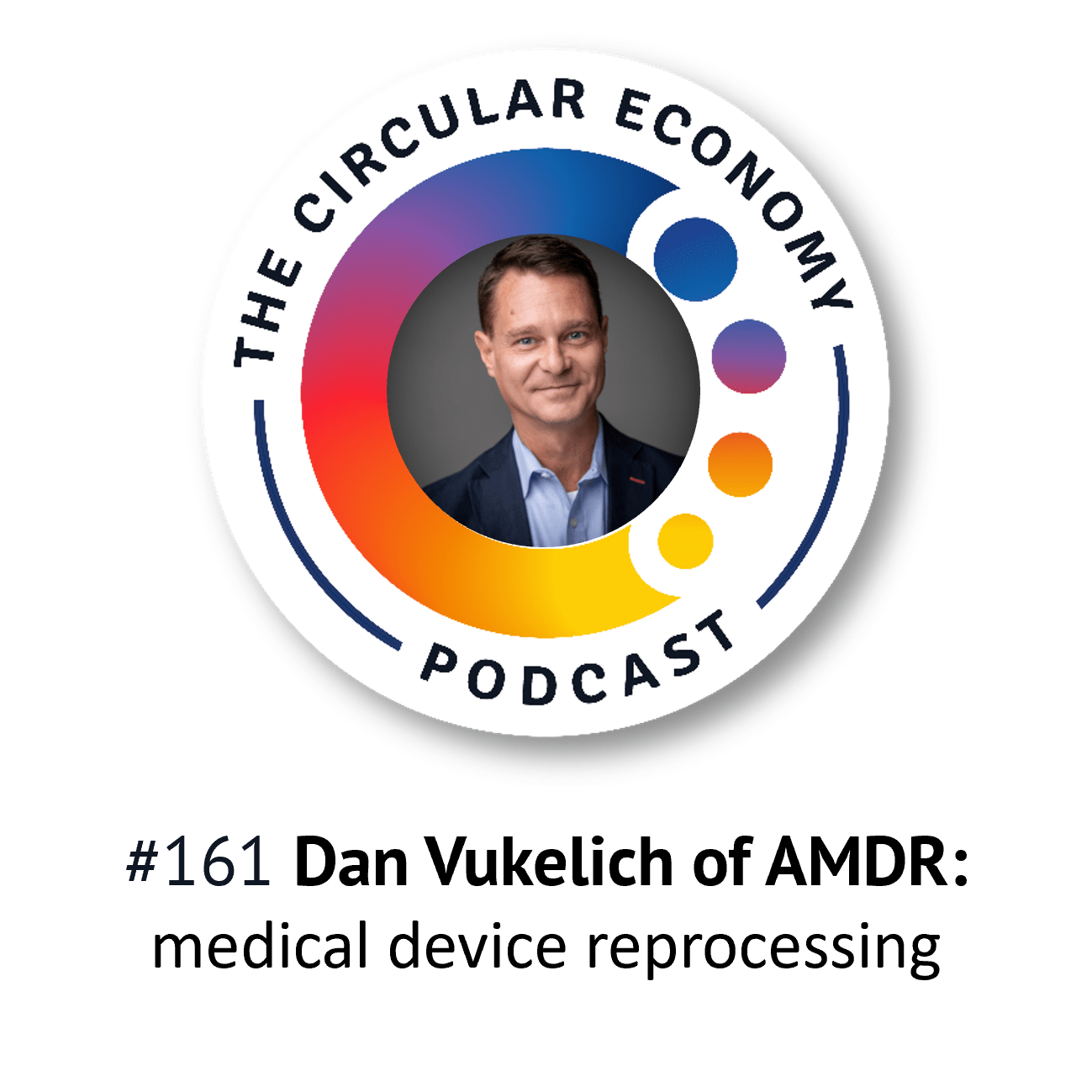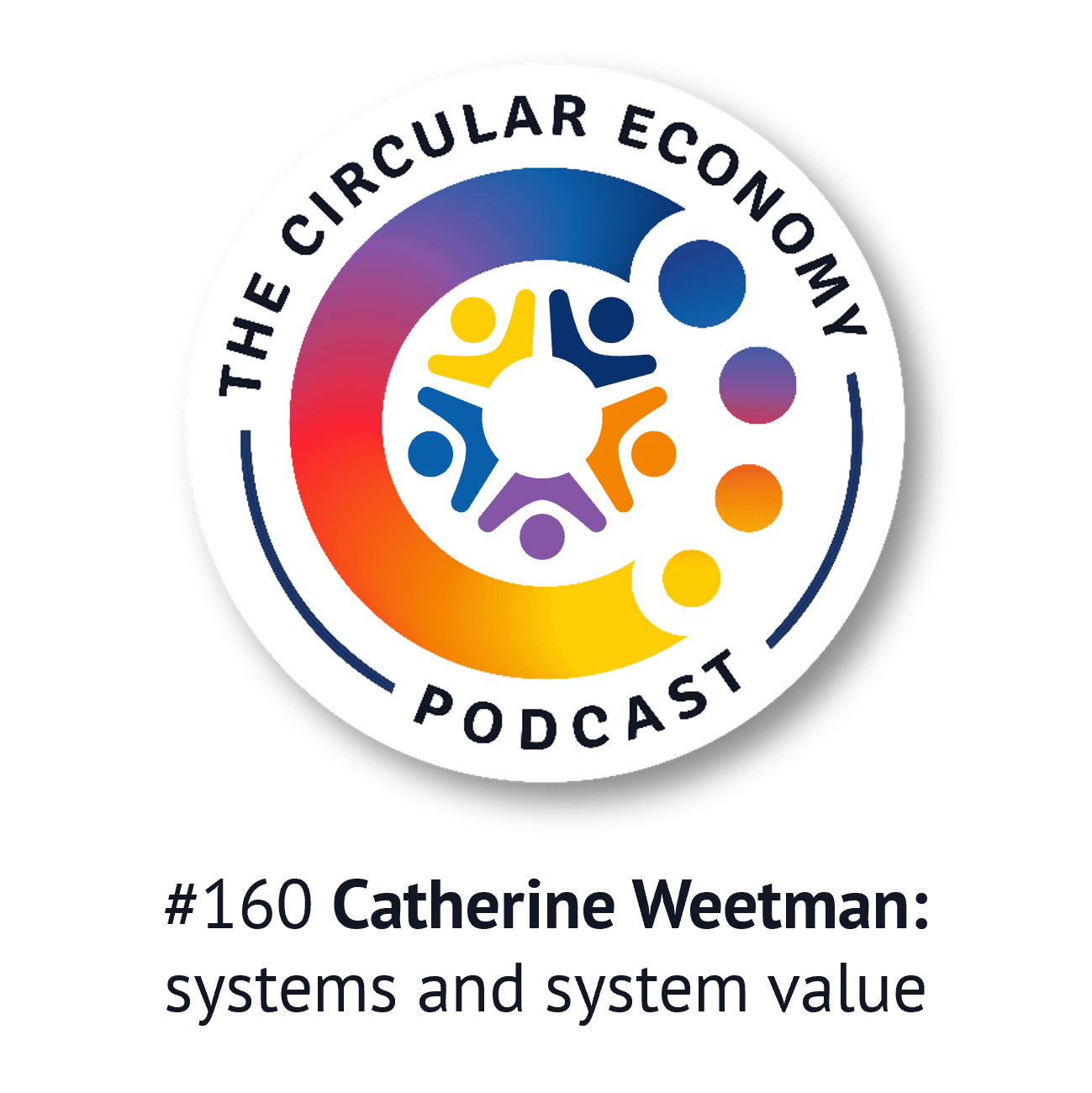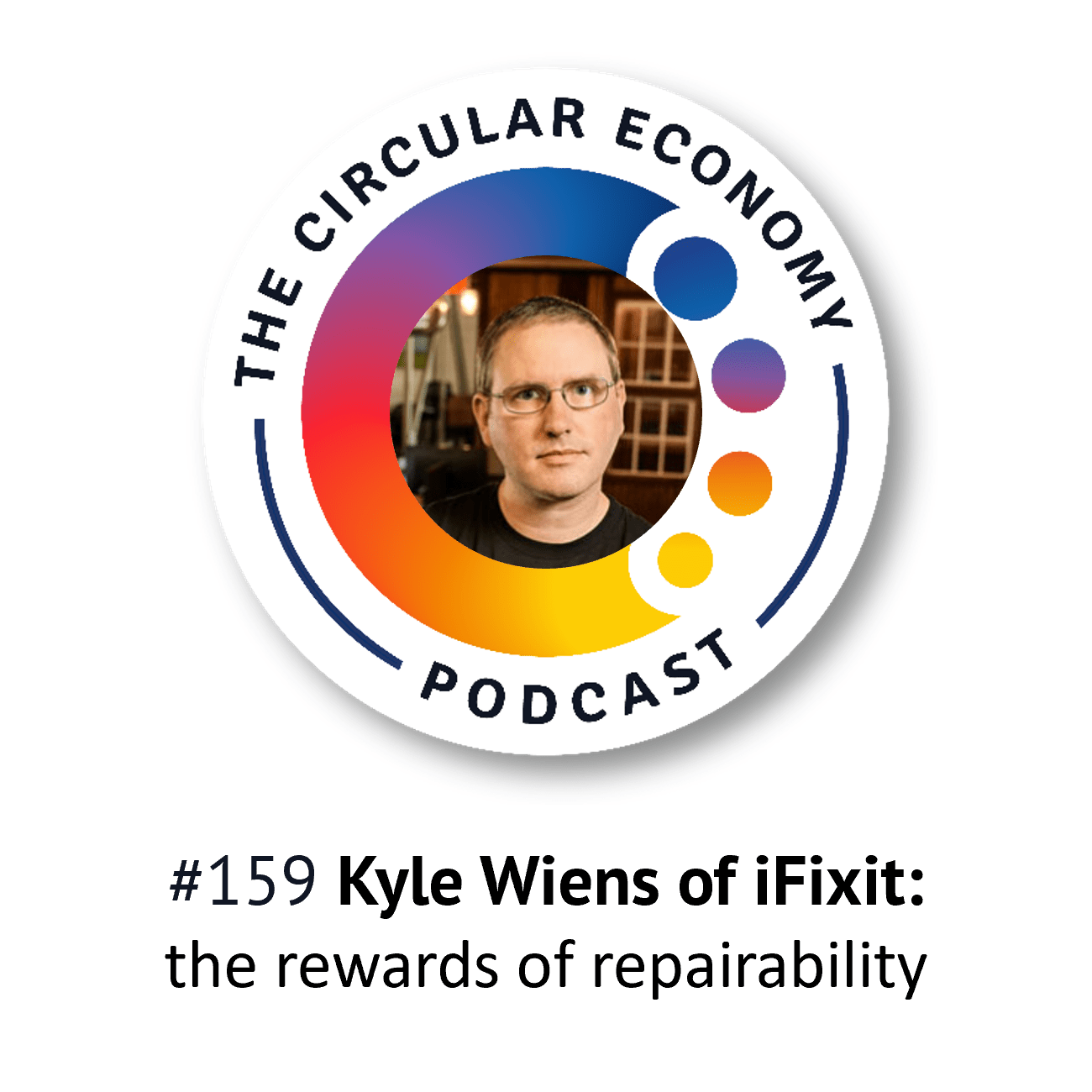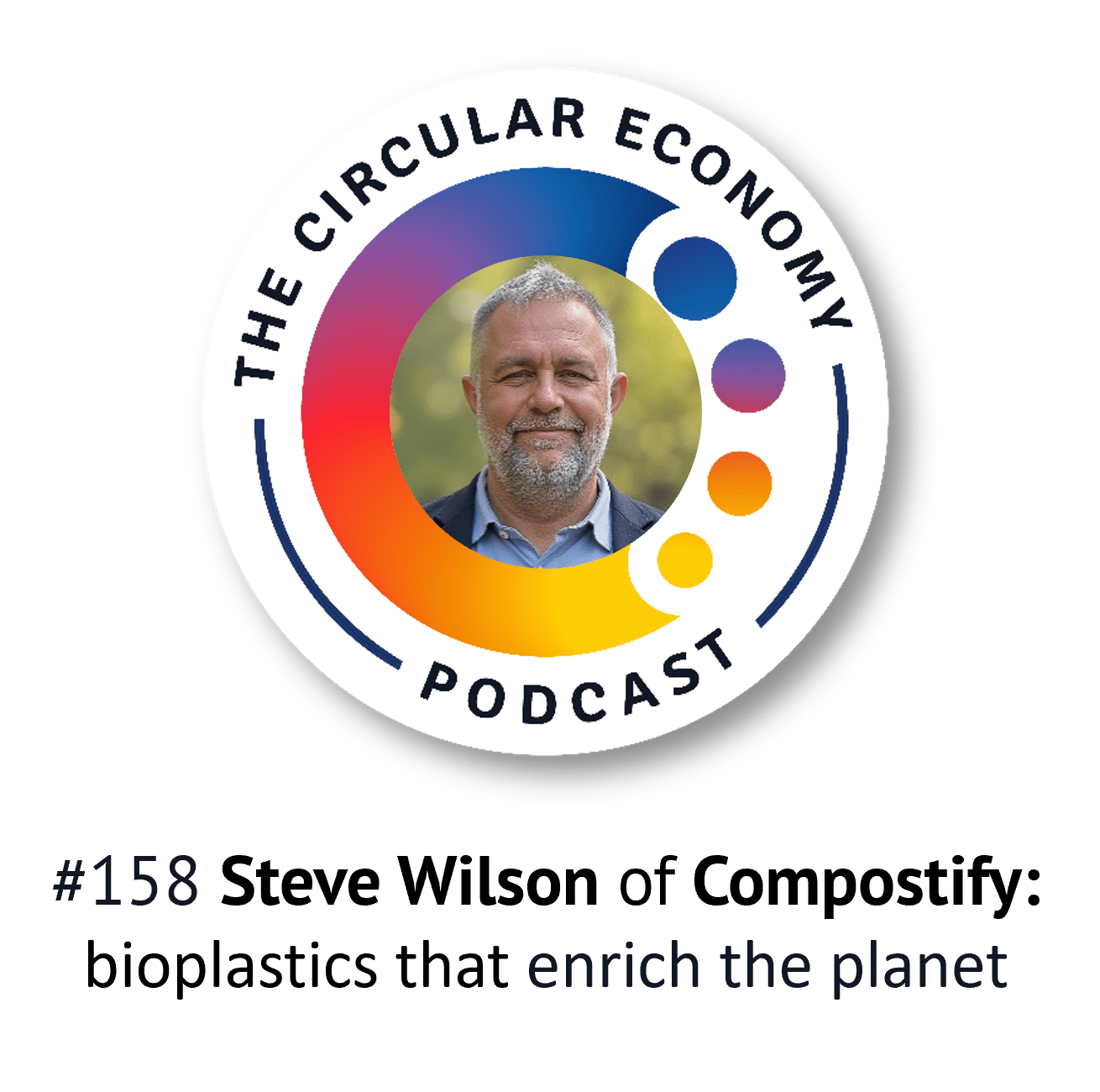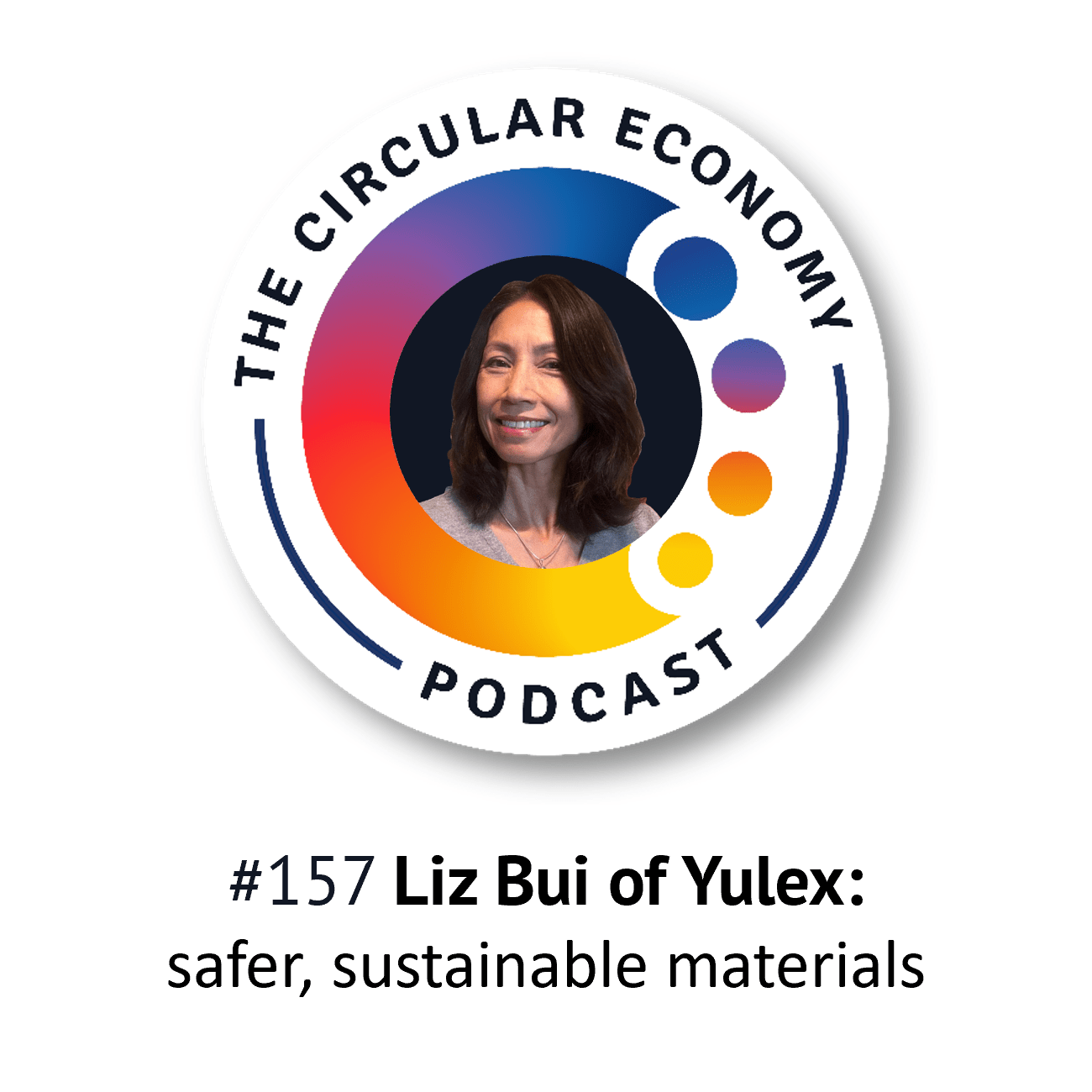Podcast: Play in new window | Download
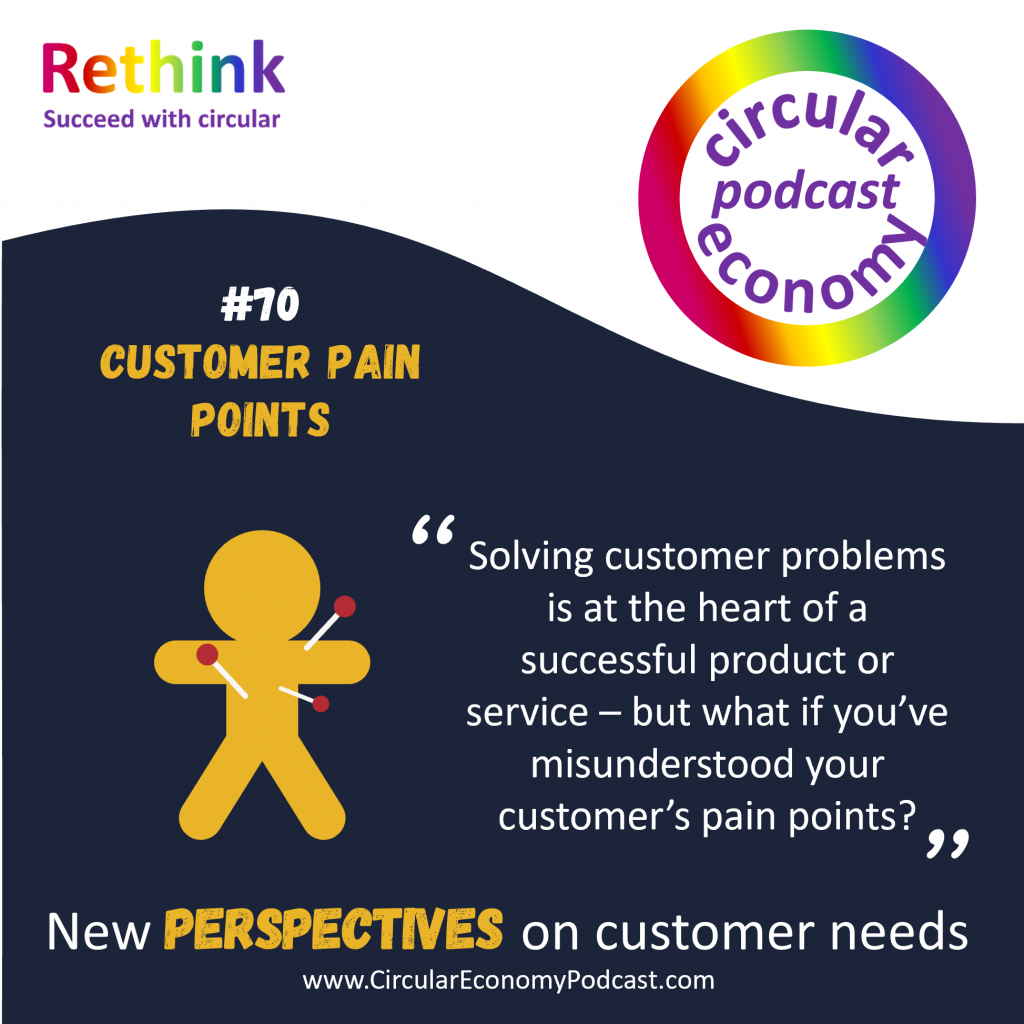
Catherine Weetman says: “Today’s episode is one of my regular round ups of the last 9 conversations. Today, I’ve chosen the theme of customer Pain Points. We’ll look at this from the perspective of both businesses, and citizens – you and me. I think some of those pain points are being overlooked by companies – that could be because they have a one-size-fits-all approach that might create value for one customer group, but doesn’t deliver, or could actually destroy value for another group.
I also think new pain points are cropping up – maybe even evolving. More of us are realising that our choices aren’t contributing to a fairer, healthier and more sustainable world, and that’s making us uncomfortable, at a conscious or a sub-conscious level. Knowing that we’re going to discard something because there isn’t a convenient way to help it be reused is also uncomfortable – and we’re finding that some of our assumptions are wrong.
For example, in Episode 69, Jo Godden of RubyMoon explained that in the UK, hardly any textiles are recycled. A small proportion is downcycled into wadding and seat fillings, some are exported for hand-sorting in low-income countries (much of which probably ends up as landfill, creating pollution and damaging local ecosystems).
The inspiration for this episode came from Dr Megan O’Connor, the founder and CEO of Nth Cycle, back in ep 67. I was struck by how clearly Megan described all the different pain points she’d identified for both the electronics sector, and for those involved in the materials for the electronics sector – both the mining companies and the recyclers.”
Podcast host Catherine Weetman is a circular economy business advisor, workshop facilitator, speaker and writer. Her award-winning book: A Circular Economy Handbook: How to Build a More Resilient, Competitive and Sustainable Business includes lots of practical examples and tips on getting started. Catherine founded Rethink Global in 2013, to help businesses use circular, sustainable approaches to build a better business (and a better world).
Stay in touch for free insights and updates…
Read on for a summary of the podcast and links to the people, organisations and other resources we mention.
You can subscribe to the podcast series on iTunes, Google Podcasts, PlayerFM, Spotify, TuneIn, or search for “circular economy” in your favourite podcast app. Stay in touch to get free insights and updates, direct to your inbox…
Don’t forget, you can use our interactive, searchable podcast index to find episodes by sector, by region or by circular strategy. Plus, there is now a regular Circular Economy Podcast newsletter, so you get the latest episode show notes, links and transcript delivered to your inbox on Sunday morning, each fortnight. The newsletter includes a link to the episode page on our website, with an audio player. You can subscribe by clicking this link to update your preferences.
Links we mention in the episode:
- A Circular Economy Handbook: How to Build a More Resilient, Competitive and Sustainable Business – buy from any good bookseller, or direct from the publisher Kogan Page, which ships worldwide (free shipping to UK and US) and you can use discount code CIRCL20 to get 20% off. It’s available in paperback, ebook and Kindle. If you buy it from online sources, make sure you choose the new edition with an orange cover!
- Sign up to get the podcast player and shownotes for each new episode emailed to your inboxLucy Antal of Feedback – winner of the BBC Food and Farming Award for her work on the Alchemic Kitchen https://www.alchemickitchen.org/ You can see a video clip of Lucy receiving the award on the BBC One Show https://www.bbc.co.uk/programmes/p0b98zsc and hear Lucy talking in detail about her wide range of projects in Episode 9 of the Circular Economy Podcast https://www.rethinkglobal.info/episode-9-lucy-antal-transforming-our-food-systems/
- ‘Convenience, shame and the myth of plastic recycling’ on Seth Godin’s podcast – Akimbo – from June 16 2021. Play it from the website – S 9 E 6 Getting stuck on a Cycle of Convenience June 16, 2021 or find Akimbo on your favourite podcast app – here’s the iTunes link https://podcasts.apple.com/us/podcast/getting-stuck-on-a-broken-cycle/id1345042626?i=1000525705368
- Lucy Antal of Feedback – winner of the BBC Food and Farming Award for her work on the Alchemic Kitchen https://www.alchemickitchen.org/
- You can see a video clip of Lucy receiving the award on the BBC One Show https://www.bbc.co.uk/programmes/p0b98zsc
- and hear Lucy talking in detail about her wide range of projects in Episode 9 of the Circular Economy Podcast https://www.rethinkglobal.info/episode-9-lucy-antal-transforming-our-food-systems/
Interview Transcript
Catherine Weetman
Welcome back, it’s ep 70, and if you’re new to this podcast, thanks for downloading!
Today’s episode is one of my regular round ups of the last 9 conversations. Today, I’ve chosen the theme of customer Pain Points. We’ll look at this from the perspective of both businesses, and citizens – you and me. I think some of those pain points are being overlooked by companies – that could be because they have a one-size-fits-all approach that might create value for one customer group, but doesn’t deliver, or could actually destroy value for another group.
I also think new pain points are cropping up – maybe even evolving. More of us are realising that our choices aren’t contributing to a fairer, healthier and more sustainable world, and that’s making us uncomfortable, at a conscious or a sub-conscious level. Knowing that we’re going to discard something because there isn’t a convenient way to help it be reused is also uncomfortable – and we’re finding that some of our assumptions are wrong.
For example, in ep69, Jo Godden of RubyMoon explained that in the UK, hardly any textiles are recycled. A small proportion is downcycled into wadding and seat fillings, some are exported for hand-sorting in low-income countries (much of which probably ends up as landfill, creating pollution and damaging local ecosystems).
The inspiration for this episode came from Dr Megan O’Connor, the founder and CEO of Nth Cycle, back in ep 67. I was struck by how clearly Megan described all the different pain points she’d identified for both the electronics sector, and for those involved in the materials for the electronics sector – both the mining companies and the recyclers.
Megan O’Connor, Nth Cycle
And, you know, my passion really expanded from there, when I was able to attend this summit called the green electronics summit when I was up at Yale University. And a professor had invited, you know, some of the folks from Apple, Dell, Intel, Samsung, at the the major electronics manufacturers and semiconductor manufacturers you can think of around the world, they were invited to Yale to talk about the major sustainability issues they saw coming over the next five to 10 years, you know, with their corporate hats on. […] And so I begged my way. And it took me about three weeks to convince the professor that I should be in this meeting. So he finally led me in as a scribe to take notes. And it was amazing, just being like a fly on the wall and listening to all of these, you know, corporate folks talk about, you know, recycling, right, recycling kept coming up over and over again, waste management was an issue, they knew it was going to continue to be an issue as more folks get new phones every year, and TVs come out and right, it’s just a larger form of electronics waste, which a lot of people don’t necessarily think of them in that way. And paired with that, you know, waste management issue, no current recycling technologies was the issue that we have with the critical minerals supply chain, right, everybody saw the shortage of cobalt and nickel and rare earth metals coming down the pipeline. You know, by 2030, there’s predicted to be a 50% supply shortage for cobalt alone. And so they were thinking, how are we going to, you know, both recycle these materials in an efficient way. And while also creating a new supply of these materials, enough so that we don’t have to slow down in terms of our development for the clean energy economy. And so I walked out of that meeting and really thought, you know, I think I could try and at least develop a technology to solve this issue. You know, can we create a very economical way to pull these materials out in a form that can be simply put back into the supply chain to create that secondary source that was sort of the other pain point they discussed.
Catherine Weetman
I was really impressed with Megan’s singleminded focus, picking up all the ‘pain points’ related to recovering critical materials from tech products. Firstly, the gap in effective recycling processes for the growing quantities of tech and the difficulty in converting the materials back into feedstocks – resources – that are suitable to go back into the tech supply chain.
Logistics is a pain point for recyclers – how to ensure safe and cost-effective collection of materials, and organise flows of similar materials into each recycling location. The safety and security issues – especially for lithium – mean it’s difficult and expensive for recyclers to consolidate the material streams to create a viable ‘critical mass’, especially if they also need expensive equipment for the recycling itself. So Nth Cycle’s low-cost equipment that doesn’t need much space is an ideal solution.
Megan described another pain point for recyclers – the variability in the make-up of recycling flows. Even if you’re just processing cellphones, the materials in the different brands and ages of the phones will vary. That makes it difficult for the recyclers to set their systems up to deal with that variability, and it means the end product – the recyclate – won’t be consistent. That can detract from its value and limit the potential markets.
Megan tells us that the Nth Cycle processes can handle that variability and produce a very consistent end-product. So that’s better quality recyclate and it improves the ease of sales and profitability for the recyclers. That could lower the barriers to entry, bring more recyclers in more countries into the market, and increase the amount of e-waste we can process globally. It might make urban mining more viable too – recovering waste tech from landfill to extract the valuable minerals. If you’ve seen one of my presentations, you might remember the quiz on gold mining extraction rates….
Back in Ep 61, we heard from Astrid Wynne, Sustainability Lead of global sustainable IT solutions provider Techbuyer, which provides refurbished enterprise servers and storage. Reliability of equipment, whether it’s a laptop or a company server, is a major factor in the buying criteria for IT departments in companies of all shapes and sizes. Astrid told us about the collaborative research projects she’s been involved in, to properly assess reliability. That research found that refurbished IT is at least as reliable as new models – possibly because of the extra testing involved. Mass produced equipment might only be batch-tested, whereas refurbished, repaired or remanufactured products are likely to be tested individually, against a range of criteria.
In Ep64, I spoke to Pierre-Emmanuel Saint-Esprit, the co-founder of ZACK, France’s leading company enabling the second life of electronic products, through recycling, repair, resale and donation. In 2020, ZACK was named as one of the top 3 French circular companies.
Pierre-Emmanuel had noticed several pain points related to disposal of IT for companies in France. They could see it was creating e-waste and leading to pollution, and that many of the IT products might be suitable for reuse, repair and refurbishment, rather than being wasted. Companies want to reduce their GHG emissions too, and to include positive actions in their CSR reports. ZACK helps close the loop on these end-of-use IT products, providing traceability and numbers to show what positive impacts have been achieved.
And in Ep 62, we were given a mini design masterclass Malin Oreback, who is leading McKinsey Design’s work in sustainability and circular economy. Malin offered us so many insights into how to engage users, and described ways to set up tests, so you can discover how people will REALLY use the product or service, on both good and bad days.
Often, people don’t realise how they actually interact with objects – it can just be part of an , sub-conscious habit. Or, if it’s something new, how people imagine they might use the object or service isn’t what happens in real life. My conversation with Malin is one of our most listened-to episodes, with lots of great tips on how to design both products and services.
So, we’ve touched on a few pain points for business customers – what about all of us as citizens (I’m trying to avoid calling us consumers… I’d rather think of us as being caring, concerned citizens.)
We’re seeing a growing shift towards ‘sustainability first’, with more people asking questions about the way we live, and challenging the ‘consumption’ habits we’re encouraged to adopt. Many of us are realising that much of our consumption seems to benefit big businesses and government GDP targets, rather than actually improving our lives. And, worse still, most of our consumption isn’t helping communities and nature to thrive.
One of my of my original circular economy heroes is Kresse Wesling, founder of Elvis and Kresse, which transforms discarded materials into innovative lifestyle products. I’d met Kresse when she spoke at a conference in 2015, and asked if I could use her handwritten slide, showing her criteria for the perfect product, for my Circular Economy Handbook. It was fantastic to have another conversation with Kresse, in Ep 68, and I asked whether she’d changed anything on that original perfect product checklist.
Kresse Wesling
I think what’s fascinating about about it is that we still use, we basically, you know, I still have that that slip of paper. And I still in pretty much every presentation I give us that slide because it is it is to me the benchmark for any new good. So the the key elements for us is that it has to be designed for deconstruction. So IE designed with death in mind. And for us that meant it would be circular. We thought it had to be component based, like Lego. And the reason I said like Legos because everybody gets what Lego is so it, it makes it suddenly unknowable thing, you know, how are you going to build that house? I’m going to build it like Lego, how are you going to build that plane, I’m going to build it like Lego then. Then people sort of start to think Yep, that’s what design deconstruction means. We also felt like it needed to be swappable, shareable, engaging. Because we were we were talking you know, we don’t work in the b2b space, we work in the b2c space. So we wanted this to be fun for people. And we wanted it to, we wanted other people to feel like it belonged to them. Because crucially, there’s been all these studies done around the longevity of items. And if people feel engaged in the CO creation of an item, they’re much more likely to hang on to it for the long term. So that was the, I suppose the last thing on that slide was something about it having a life of its own. And this is really, this is really wild, I suppose, especially in the design world, or in the creative sector, where people revere designers, and how genius and wonderful they are. Well in the circular economy world. What you if you design like this for deconstruction, what you’re saying from day one, is that someone else at some other time in the future, may be able to do something better than this, with this than I can do right now. It’s not about the designer anymore. It’s not about ego. It’s just about enablement, and engagement. And the only other thing I would add to this slide really is that everything has to be regenerative. Because it isn’t enough just to be sustainable at the at the very low, low place we are with respect to people and climate. It we need to be giving back more than we’re taking now.
Catherine Weetman
We got a bit scientific in Ep 65. Charlotte Morley, founder of childrens’ wear rental company thelittleloop, explained the relevance of Hertzberg’s ‘hygiene factors’. Frederick Herzberg was a 20th Century American psychologist who became one of the most influential names in business management, famous for introducing job enrichment and the Motivator-Hygiene theory.
Let’s have a listen back to our conversation in Ep 65:
Catherine Weetman
…For childrens wear, Charlotte said it has to be high quality, it has to be great value. And it has to be convenient. So you have to meet those criteria first, and then all those people wanting to be green will consider Which brand is the more sustainable and use that to inform their choice. This is a new kind of service one that’s evolving and disruptive. It’s crucial to keep learning more about why people want to rent and to avoid potential distractions in trying to meet a wide range of other customer requirements.
Charlotte Morley
I mean, children’s wear is different from other other clothing. But every single parent that we’ve spoken to has given us the same what we call the hygiene factors. So with children’s wear, it has to be high quality, it has to be great value, and it has to be convenient. And we tend to put style under qualities like a subheading, so for us quality is comfort, style washability design and you know, has it got poppers in the right places, etc. So we put all of that under quality, but then value and convenience, and I think I think a lot of people go into sustainable business thinking they just need to be sustainable. And what we learned very quickly and actually kind of knew anyway, but was that you have to meet the hygiene factors, before sustainability starts to kick in, you know, there are very few consumers out there who will buy something just because it’s sustainable, if it doesn’t meet those basic needs, and so that’s, you know, that’s where we’ve started, we’ve tried to meet those three needs before the sustainability then you know, has it has an opportunity to become a benefit, if you like. And I think it’s probably fair to say that there aren’t many other sustainable certainly children’s wear options, which meet all three of those. So there tends to be a compromise somewhere. So like peer to peer resale is great, but it’s not very convenient, it’s very time consuming. It’s a hassle.
I have one fabulous customer. She’s one of our brand ambassadors, and she lives in a caravan on like a communal site with lots of other people who is an eco community is the best way of describing it. She loves rental because she doesn’t have a lot of space for children’s clothes. So she has a small selection of summers, which she wears, and then she swapped them out when she needs to. And yeah, I have people who rent from me because they love children’s clothes, and they want to be able to change, you know, they want their children to look beautiful. And they recognise the value and the convenience of doing it this way. And then much more kind of mainstream, I think you would describe them as you know, I haven’t there’s a real range. I think what is shared between them is that they all describe sustainability as the main driver.
Catherine Weetman
So, our definition of convenience is shifting, and we also need to consider that a convenient option for one group of customers might be inconvenient for others… that was something Brian Bauer of Algramo explained back in Ep 42. Grocery brands that sell their food, personal care and household cleaning products in single-use packaging – whether recyclable or not – create lots of problems for people living in regions with no municipal waste or recycling systems. Disposing of your packaging in a responsible way becomes extremely difficult, especially if you don’t have transport. Often, that means it becomes a health issue, attracting vermin and polluting soil and water.
Talking about municipal recycling brings us onto ep 63, with Hede Razoky of the UpcycleCentrum in Almere, in the Netherlands. Hede is working towards a shared goal of a ‘world without waste’, and the UpcycleCentrum supports entrepreneurs who transform specific municipal recycling streams – the discarded household materials that come into the city recycling system – into high-value products. Showcasing the entrepreneurs and their solutions, together with other UpcycleCentrum initiatives, helps raise awareness of the importance of recycling (instead of letting things go to landfill or incineration), and has improved recycling rates across the city. This all helps improve the potential for recycling to create value, instead of incurring cost for the city residents.
In Ep69, Jo Godden, founder of activewear brand RubyMoon told us about the major R&D project they are working on, to find a sustainable way to recycle the polyamide and elastane fibres that feature in most swimwear and active-wear garments. Customers are worried about this, and don’t want their clothing choices to create environmental pollution. People are keen to wear more natural fibres – but natural fibres don’t have the same strength and stretch properties as these specialist synthetics. So a circular solution is to find an ecologically sound way to recycle those fibres so they can be used to make new, high quality activewear garments.
There are lots of other health issues related to the things we buy – and staying with the topic of clothing, we learnt about healthy and unhealthy fashion from Alyssa Couture, the author of Healthy Fashion, in Ep 66. Here are some of my takeaways from the end of that episode:
We only scraped the surface of all Alyssa’s work, helping people understand how what we wear impacts the health of our living planet, those people producing the garments, and the health of all of us – what touches our skin also makes a difference our day to day health. I was amazed to hear how many plants have been used to make textiles in the past – Alyssa’s research uncovered between 500-700 different plants just in S America.
Of course, it’s a similar problem to our the food system – if we rely on a handful of crops to produce textile fibres, we leave the producing regions, and the textiles supply cains in vulnerable positions, at risk of losing harvests to disease, crop failures and adverse weather conditions.
So we can see it makes much more sense to broaden the range of plants we can use, especially if those crops are particularly suited to different regional growing conditions. If we can use crops that have multiple purposes – for fibres, medicines, foods, cosmetics and more – that’s even better.
These unhealthy side-effects – these pain points – are deeply embedded in our industrialised agriculture systems. Farming for textiles, food and other uses has become reliant on monoculture crops, often needing lots of chemicals to avoid pest and disease. Cotton is one of the most pesticide and water intensive plants, and of course all those pesticides can affect the health of local communities, as well as the farmers and cotton plantation workers – and of course, it’s harming local biodiversity.
So what’s the #1 takeaway from this episode? As Seth Godin says, “Don’t find customers for your products, find products for your customers.” In other words, we need to be really clear on what our customers want, and how we can design and provide something that improves their lives, and reduces their ‘pain’.
That pain could be complexity, inconvenience, or, these days, something that doesn’t fit with their values. If there is no end-of-use recycling option, that could create an uncomfortable feeling of guilt for your customers – or worse, it could damage health, for humans and nature. Even if there is a recycling system, that is ultimately paid for by citizens – all of us as taxpayers, not by the company that’s created the problem in the first place.
Going back to that great advice from Malin Oreback of McKinsey Design in Ep62, we need to understand what customers actually do, not what they say, or believe they do. Find ways to test out your designs in real life!
If you want to hear more from Seth Godin on recycling, have a listen to the short episode on ‘Convenience, shame and the myth of plastic recycling’ on Seth Godin’s podcast – Akimbo – from June 16 2021. I’ll include a link in the shownotes.
Finally, at the end of December I was listening to the BBC Food and Farming Awards on Radio 4, with a woohoo moment when I heard that one of our early podcast guests, in Episode 9 – Lucy Antal of food waste campaign group, Feedback, had been crowned BBC Food and Farming Awards Community Food Champion, 2021.
Lucy won the award for her brilliant project for Feedback – the Alchemic Kitchen – I’ve included a link to the website, plus a video clip of Lucy receiving the award on the BBC One Show.
Lucy is amazing, inspiring and absolutely committed to creating better, fairer, more nutritious and circular food systems – I’ve included a link to episode 9 with Lucy, and those other links in the shownotes for this episode. And of course, Congrats to Lucy Antal!
So that’s it for this episode of the Circular Economy Podcast, rounding up the last nine conversations with inspiring people from France, the Netherlands, Sweden, the US and the UK – all helping make the circular economy happen.
Thank you to all our guests, and thank you for listening. As usual, you can check out the other links we mentioned in the shownotes at the circulareconomypodcast.com.
Want to find out more about the circular economy?
If you’d like to learn more about the circular economy and how it could help your business, why not listen to Episode 1, or read our guide: What is the Circular Economy?
To go deeper, you could buy Catherine’s book, A Circular Economy Handbook: How to Build a More Resilient, Competitive and Sustainable Business. This comprehensive guide uses a bottom-up, practical approach, and includes hundreds of real examples from around the world, to help you really ‘get’ the circular economy. Even better, you’ll be inspired with ideas to make your own business more competitive, resilient and sustainable.
Please let us know what you think of the podcast – and we’d love it if you could leave us a review on iTunes, or wherever you find your podcasts. Or send us an email…
Podcast music
Thanks to Belinda O’Hooley and Heidi Tidow, otherwise known as the brilliant, inventive and generous folk duo, O’Hooley & Tidow for allowing me to use the instrumentals from the live version of Summat’s Brewin’ as music for the podcast. You can find the whole track (inspired by the Copper Family song “Oh Good Ale”) on their album, also called Summat’s Brewin’. Or, follow them on Twitter.
